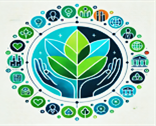Services
generational demands for sustainable inc.

Public Sector Sustainability and Management
Governments and public institutions play a pivotal role in shaping sustainable societies. As we approach the end of the UN 2030 Agenda, coupled with the Africa Agenda 2063, national governments, businesses, and civil society organizations are highly encouraged to localize these Agendas through a national development framework and take urgent actions to combat climate change and its impacts. Public sector institutions must take the lead and provide direction and transparency on how they contribute to or aim to contribute to sustainable development to ensure effective, accountable, and inclusive sustainable public service delivery. We collaborate with public sector entities to embed sustainability into their policies, programs, and projects.

Sustainability Engagement and Stewardship
We empower organizations to lead sustainability initiatives that inspire systemic change. By fostering a culture of responsibility and innovation, we help institutions integrate sustainability into every aspect of their operations. Our programs focus on leadership training, creating sustainability champions, and developing stewardship frameworks that align with national, regional, and global best practices.

Materiality/Sustainability Impact Assessments
Understanding what matters most is key to making an impact. Comprehensive analysis of your environmental, societal, and economic effects, accompanied by actionable strategies to mitigate risks and enhance opportunities. We conduct thorough assessments to identify critical sustainability issues affecting your organization and stakeholders. Our expertise in materiality mapping, impact analysis, and risk assessment ensures your organization prioritizes actions that create value, build resilience, and enhance reputation

Development of Sustainability Framework and Policy
Robust policies are the foundation of meaningful change. We work with organizations to craft sustainability policies that guide decision-making and operational practices. Our approach ensures that policies are comprehensive, enforceable, and aligned with international, and regional standards like the SDGs, Paris Agreement, Africa Agenda 2063, and national development frameworks. We design strategies that turn aspirations into tangible results. Whether you are embarking on your sustainability journey or refining an existing strategy, we provide actionable roadmaps tailored to your goals. Our end-to-end services include strategy development, goal setting, KPI identification, and ongoing performance management to ensure sustained progress.

Stakeholder Engagement and Partnerships
In a connected world, collaboration is essential for progress. We facilitate partnerships between businesses, governments, NGOs, and communities to align efforts and resources. Building strong relationships with stakeholders is critical for successful sustainability initiatives. We design and implement engagement strategies that foster trust, collaboration, and mutual understanding. Our solutions include public consultations, community outreach programs, stakeholder mapping, stakeholder workshops, partnership negotiation, and the creation of multi-stakeholder platforms to advance shared sustainability goals tailored to diverse audiences

Climate Change Risk Assessment and Mitigation
Climate risks are becoming business-critical. We evaluate exposure to physical, transitional, and regulatory risks and develop strategies to mitigate them. Our services range from carbon footprint analysis and renewable energy integration to climate adaptation planning for vulnerable sectors.

Partnership and Advocacy
At Gen Demands for Sustainability, we drive transformative change by fostering multi-sector collaborations and strategic advocacy to advance sustainability goals. We connect governments, businesses, civil society, and international organizations to unlock innovative solutions, mobilize resources, and influence policies. Through stakeholder engagement, coalition building, and evidence-based advocacy, we amplify voices, shape sustainable development agendas, and drive collective action. Our expertise ensures that sustainability remains a priority across sectors, turning commitments into tangible impact.
